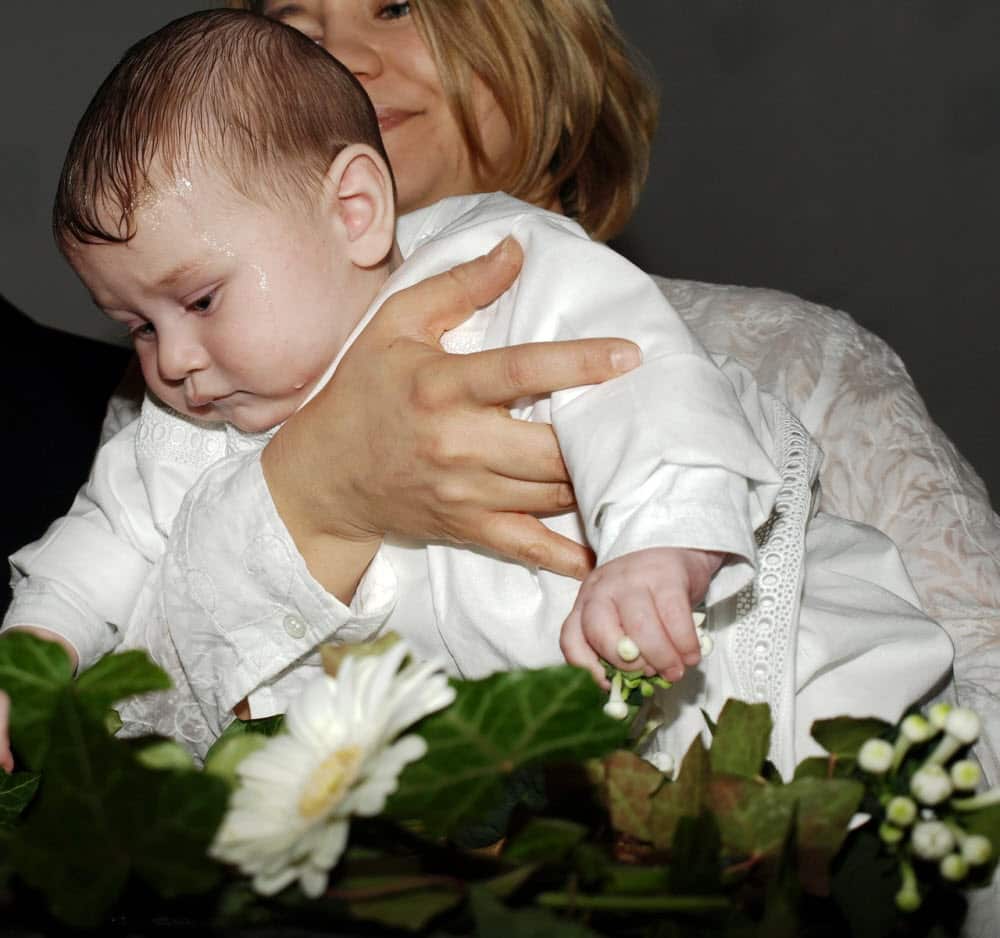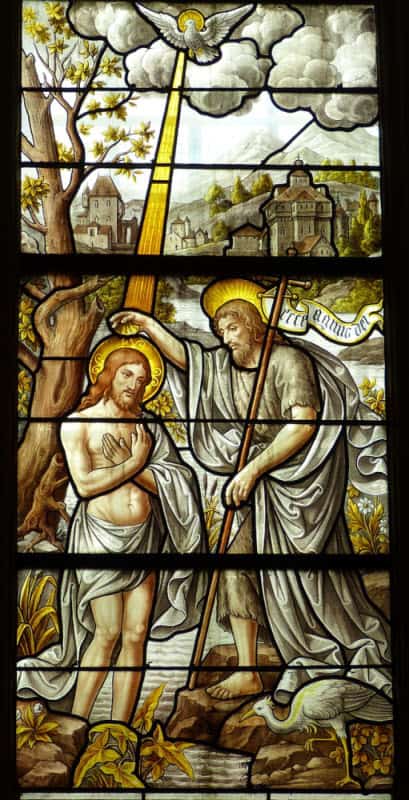This is a complete lesson plan on baptism.
This teacher’s copy of the What is Christian baptism? lesson plan is printer-friendly.

Table of Contents menu
Table of Contents:
1. Resources for the baptism lesson plan:
Clear glass tumbler containing muddy water.
A bowl of clean water.
A tray, or dish containing sticky mud.
Some tissues to clean things!
2. Starter for the baptism lesson plan:
Q. What sort of special events do people celebrate and how?
(Possible answers: birthdays, weddings, anniversaries, Christening, baptism, etc).
Q. Why do you think people want to share special occasions with others?
(Possible answers: to have a party)
Q. Why do couples have a wedding day?
Why not just say: “We’re married now?”
- It declares to a large group of people, (friends, family and relatives), in a formal way: “We are married”.
- It is an occasion where the couple makes promises to each other to stay together no matter what.
In many weddings, promises are made to God as well. - It is a definite date to look back at and remember the day.
- At the wedding the words are declared: “You are now husband and wife”.
It’s someone else confirming that the couple are married. - The giving of rings on that day shows that they are married.
3. Main teaching for the baptism lesson plan:
a) What baptism celebrates
Q. When someone becomes a Christian, is there a special event that celebrates that?
Yes, the event is called ‘baptism’.
Q. Why do they have this event? Why not just say: ‘I am a Christian.’
The answer is very similar to what has just been said about the wedding day:
- It declares to a large group of people, (friends, family and relatives), in a formal way: “I am a Christian”.
- It is an occasion where that person shows that they have faith in Jesus Christ and that they intend to do that for the rest of their life.
In other words a promise. - It is a definite date to look back at and remember the day.
- The minister / Christian leader will in some way confirm their decision to be a Christian.
- Although there is no ring given on that day, Christians believe that God gives them His Holy Spirit as a ‘seal’ (as a ‘ring’):
Having believed, you were marked in him with a seal, the promised Holy Spirit”
Ephesians 1:13 (NIV)
b) The origin of baptism
Q. Does anybody know where this idea of being baptised comes from?
John the Baptist used to baptise anybody in the river Jordan to signify that the person wanted to turn from their wrong ways and turn to God. (Matthew 3:1-)
Then Jesus came to John and asked to be baptised, even though Jesus had lived a perfect life.
John refused, so Jesus said:
Let it be so now; it is proper for us to do this to fulfil all righteousness.”
Matthew 3:15 NIV
So John agreed, and as Jesus came up out of the water, the Holy Spirit came upon him in the form of a dove and God said in a loud voice:
This is my Son, whom I love; with him I am well pleased.”
Matthew 3:17 NIV
c) What baptism means for Christians
Baptism is in the Bible. Simon Peter, a disciple of Jesus, said:
Each of you must turn from your sins and turn to God, and be baptised in the name of Jesus Christ for the forgiveness of your sins.”
Acts 2:38 (NIV)
The word ‘baptised’ means to ‘dip, immerse or wash in water’, and ‘sins’ are all the wrong things that we do.
So to become a Christian means; that someone turns away from the wrong things they do, and turns to God.
And the event to celebrate this is called baptism or to be baptised.
d) Two options to be baptised
[1] Infant baptism
Parents who are Christians (ideally) want their baby to be baptised:
At the Baptism Service the parents, and godparents, make certain promises. Godparents are chosen by the parents to help in training the child in the Christian faith.
Here is what the minister would say in an Anglican church:
The parents and godparents answer: “I am willing”.
Children who are too young to profess the Christian faith
Anglican baptism service
are baptised on the understanding that they are brought up as Christians
within the family of the Church.
As they grow up, they need the help and encouragement of that family,
so that they learn to be faithful in public worship and private prayer,
to live by trust in God, and come to confirmation.
Parents and godparents, the child whom you have brought for baptism
depends chiefly on you for the help and encouragement they need.
Are you willing to give it to them by your prayers,
by your example, and by your teaching?”
Q. In your own words, what are the parents and godparents promising to do?
The minister, or vicar, said: “and come to confirmation”.
This means attending a special ‘Confirmation Service’ which is held when the baby has grown to be about 13 years old.
Q. Why is it called a Confirmation Service?
Because they are now ‘confirming’ the promises for themselves, that were said then.
The special ‘Confirmation Service’ is held when the child is old enough to accept the Christian faith for themselves.
[2] Believers baptism
Another way of being baptised is when someone is old enough to make the decision to become a Christian:
So a Baptism Service can be organised.
The person being baptised can make certain promises, and/or they would tell of the reality of their own faith.
The actual baptizing can be done in several ways:
- By sprinkling water on the head or forehead.
- By standing in water, and sprinkling or pouring water on the head.
- By totally immersing the whole body quickly underwater.
The last two are usually carried out in a Baptistery which is a small pool set in the floor of a church.
Baptisms can also take place in a river, a lake or in the sea.

e) Baptism indicates a change in lifestyle
First, let’s look at the example of the wedding:
Before the wedding, ideally, there were two individuals living in two different houses with two separate lifestyles.
When they get married, that old life ceases, it’s dead and gone, and a new ‘married’ life begins.
They share a house, eat together, etc, they have started to live this new life together.
Q. How does Baptism mark a change of lifestyle?
Think of the wedding example.
Baptism marks a new life together – that person and God.
Before that person was living their life independent of God, now that old life has ceased, it’s dead and gone, and they are living this new life with God.
Baptism symbolises being washed.
Q. Why would we need washing?
Christians believe that living independently of God is wrong. It would be having a bad attitude towards God.
(Teacher’s note: Fill a clear glass tumbler with dirty water in it (add soil or ink).)
This tumbler represents a person, and the liquid represents their attitude towards God – in our case, a very bad attitude!
But when a person becomes a Christian, that attitude changes. Instead of pushing God away, they now want to please him.
So that bad attitude has gone.
(Teacher’s note: Rinse out the tumbler and replace it with clean water).
So baptism symbolises that washing.
But we need to continue the illustration further. Just because this attitude has changed, it does not mean that this person is now super clean, and will remain super clean!
(Teacher’s note: Pick up the tumbler with the clean water in it, continue to hold it upright, and push it through a tray containing sticky mud).
As they live their everyday lives they do wrong things, they say wrong things, and they should have done good things but they don’t!
Their overall attitude is still wanting to please God – the water in the tumbler is still clear.
But they make mistakes so that is why there is all this dirt on the tumbler.
They don’t need to get baptised again!
They need to say sorry to God for these things.
(Teacher’s note: clean the outside of the tumbler).
4. Plenary for the baptism lesson plan
Design a poster showing:
Why couples have a wedding day, or why someone gets baptised.
(Teachers note: There is a Baptism worksheet to accompany this lesson plan
See also: What is Christian baptism? RE resources)
What is the purpose of baptism?
It is a visual display of what has happened spiritually:
1) The person has died to their own selfish life (by being lowered into the water).
2) They are washed from all the wrong things they have done (by being in the water).
3) They are raised to a new life of following Jesus Christ (by coming up out of the water).
4) It is in obedience to Jesus’ command:
“Therefore go and make disciples of all nations, baptising them in the name of the Father and of the Son and of the Holy Spirit, and teaching them to obey everything I have commanded you.” Matthew 28:19-20 NIV
What happens if I don’t baptise my child?
People can get to heaven without being baptised, remember the thief on the cross, Jesus said to him: “Truly I tell you, today you will be with me in paradise.” (Luke 23:43) Even though the thief had not been baptised.
Where it says: “Repent and be baptised” (Act 2:38) this forms a part of our path of obedience and it helps us to make a public declaration of faith.
So no, baptism is not necessary for salvation.
Why did Christians start baptising babies?
1) What the Bible says about infant baptism:
In Acts, the jailer and all his household were baptised by the apostle Paul and Silas, so could we say that there were babies included? No, because it then states that he had come to believe in God, he and his whole household. (Acts 16:34) So all must have been old enough to understand and decide for themselves.
Another verse says the same in Acts 18:8
The apostle Paul wrote: “I also baptised the household of Stephanas” (1 Corinthians 1:16), but we cannot assume whether there were babies included or not.
2) When the early church carried out infant baptism:
We only know that the earliest reference to infant baptism was by Irenaeus around AD180.
There are three references by Origen (AD185–254) to infant baptism as a customary practice.
3) How we should view infant baptism now:
If someone believes in their heart that they have been baptised and they have an active faith, we should accept them regardless of the method or when it was done.
If we do not accept them, we are saying that one ritual is more important than another ritual.
